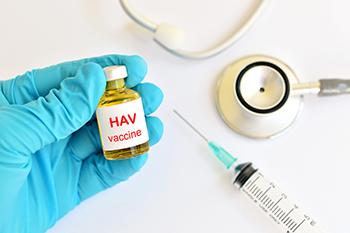- Hepatitis A is a virus that can cause inflammation of the liver.
- Symptoms of hepatitis A infection may include jaundice (yellow eyes or skin), abdominal pain, dark urine, pale (light-colored) stool, extreme tiredness, loss of appetite, fever, nausea or vomiting.
- The illness usually occurs between 15 to 50 days after exposure to the virus.
- Hepatitis A is very contagious, meaning it can spread easily from person to person.
- It is usually spread by the fecal-oral route, when an infected person doesn’t wash his/her hands well, and then contaminates food, drinks, or objects that others put in their mouth.
- Outbreaks can occur from contaminated food, but also more recently have been reported throughout the United States among persons who use injection and non-injection drugs, and/or who are homeless.
- People are infectious from two weeks before to one week after onset of jaundice or elevation of liver enzymes.
A safe effective vaccine is available to prevent hepatitis A infection and is part of the routine recommended vaccination schedule for all children (at age 1 year) and for certain adults with increased risk for hepatitis A or severe disease. See below for more information.
Hepatitis A vaccine can also decrease the risk of infection in people exposed to hepatitis A if given within two weeks of exposure. HCA Epidemiology will assist in recommendations for post-exposure prophylaxis of contacts of cases.
Hepatitis A is reportable in Orange County within one (1) working day of identification. To report a case, health care providers/facilities should call OCHCA Communicable Disease Control Division at 714-834-8180 or fax records to 714-560-4050.
Latest News
- CAHAN San Diego - Increased Hepatitis A Cases Associated with Homelessness, Drug Use in San Diego County (5/16/2023)
- CD Health Alert - Increase in Hepatitis A Cases With No History of Travel (3/7/2019)
- CDC Hepatitis A Outbreaks
- Hepatitis A Case with History of Illicit Drug Use in Orange County (12/3/2018)
- Infants aged 6-11 months traveling outside the United States to areas with high or intermediate risk of hepatitis A should be vaccinated against hepatitis A
- Hepatitis A Cases with No History of Travel in Orange County (9/21/2018)
- Dose of Immune Globulin Increased for Pre- and Post- Exposure Prophylaxis of Hepatitis A
Healthcare Professionals
Resources
- Fact Sheet, Hepatitis A (English) - (Spanish)
- Hepatitis A Infographic (English) - (Spanish)
- Homeless Facility Flyer (English) - (Spanish)
- Hepatitis A Vaccine – CDC Vaccine Information Statement (VIS)
- San Diego County Hepatitis A Guidelines and Resources


